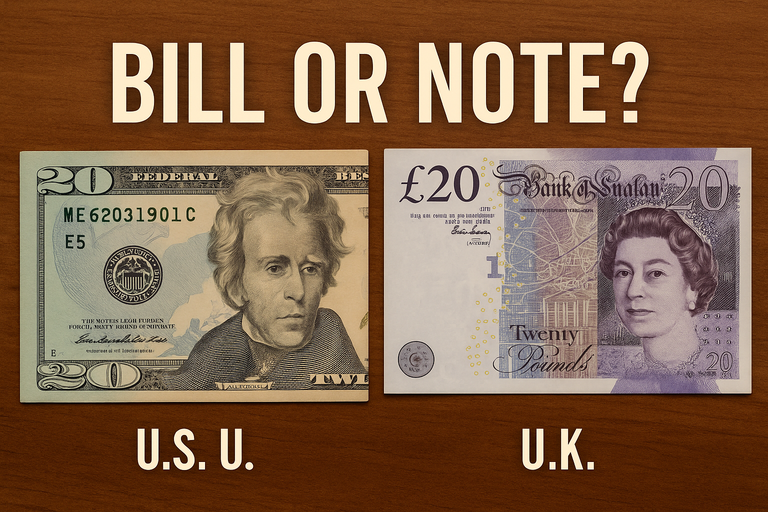Bill or Note?

Ever notice how Americans talk about bills, but Brits talk about notes?
In the US, we pull a twenty-dollar bill from our wallet. In the UK, it's a twenty-pound note. Both refer to the same thing — paper currency — but the difference in terminology is more than just a transatlantic quirk: it's a linguistic divide that reflects deeper patterns in English usage and monetary history.
The word note comes from the longer term banknote. That may seem obvious, but it's worth saying. What might be less obvious is that the word banknote itself is a relic of a time when paper money really was just a promissory note issued by a bank. This terminology stuck around in British English, and it's still the formal term in both countries. The US Treasury itself uses note in legal contexts; just look at a dollar bill and see "Federal Reserve Note" printed at the top. But in everyday American speech, we dropped "note" in favor of bill, a more casual term that may have evolved from phrases like bill of credit or bill of exchange, both of which refer to promissory financial documents.
In other words, note was the formal term, bill the informal. Over time, the US favored the informal in speech, while the UK held onto the formal.
And that's pretty much it. Just another case of the US embracing casual language before it was cool.
Looking beyond English, most of the world went the note route. French has billet (basically "note"), German Banknote, Japanese uses 紙幣 (shihei, literally "paper currency") or sometimes just お札 (osatsu, which also means "note"). Spanish uses billete ("note"). Even Canadian English tends to follow British usage, with note as the more common term in speech.
So while "bill" may feel natural to Americans, it's actually the outlier on the global stage. Most other countries lean toward note, either directly or in translation. And it’s worth noting — pun intended — that the US is internally inconsistent: we still use note in formal legal terms, like Treasury notes, promissory notes, and the printed label on our currency. It’s just that everyday speech prefers the other term.
But we also tend to use Imperial for everyday measurements, even though we officially define everything in metric.[1] American inconsistency doesn’t stop with paper money.
Language does what it wants, of course. But if you're writing something formal, internationally read, or even just a blog post like this one, note might be the better bet. That’s generally the approach I take here — when in doubt, I go with note (or banknote).
Ok, to be pedantic, technically the US system is a bit different from the Imperial System. Both the US system, which we might call US Customery Units, and the Imperial System evolved from the old English system. They are similar but not exactly the same. Compare a US pint (473ml) with a British pint (568ml), and you’ll quickly realize that when it comes to ordering a beer, you'd be better to do so in the UK. ↩
From your own description, the French use billet, so there may also be some influence from the early American alliance with France against England, and then from cross-cultural interactions through the French revolution and and on into Napoleonic era leading to the adoption of "bill." That's just a guess, I admit, but it sounds plausible enough.
What catches my attention is that the terms we use aren’t just words as they carry history, culture, and economic development behind them.
the german colloquial term is "Schein" (pronounced 'shine') which literally means "appearance" or "seeming like something".
Geldschein becomes 'money appearance', which is exactly correct. fiat is not money. we are just taught to believe it is.
words have meaning and often what we officially call something has been put out there on purpose to confuse people and to hide the true meaning and relationship of concepts.
Seems about par for the course with most things between us and them :)
It does say "Federal Reserve Note" right at the top. We don't pay for anything, we offset debt; we exchange a bill for a bill or a check for a check.
I was just thinking of all the military language we use for financial transactions. We ORDER a coffee, we are CHARGED in return, we either authorize the coffee supplier to CHARGE our credit card, or we settle the CHARGE with a BANKNOTE.
All modern transactions pass the debt on to someone else, either to a BANK or to the TREASURY. This is because the only lawful "money" is precious metal like gold, silver or copper. Or some tangible object for trade.
The coffee shop owner is supposed to take all the "banknotes" to the bank and REDEEM them for lawful money, ie silver ... But that day is long gone. Now everything is numbers on a ledger, redeemable for irredeemable "notes" or "bills".
Huh. The more you know.